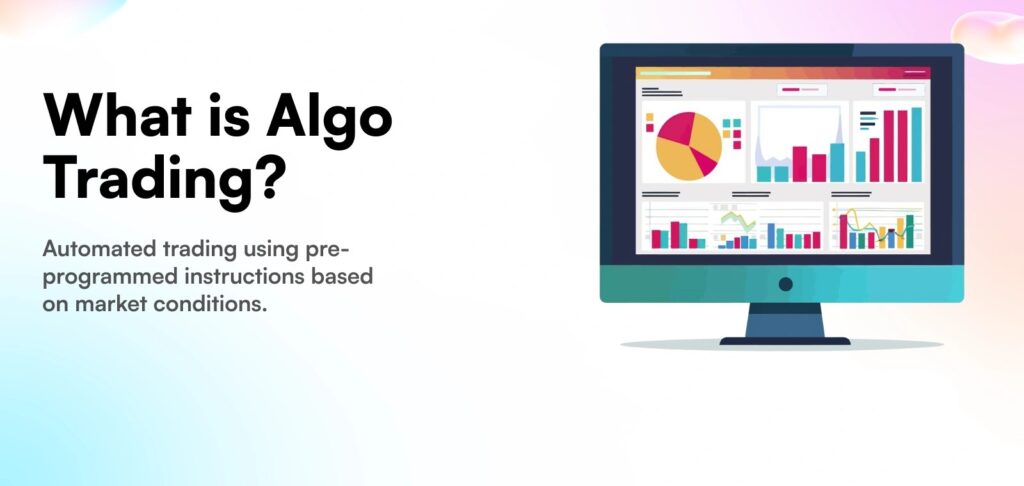The National Stock Exchange (NSE) has rolled out a groundbreaking framework for retail algo trading, making automated trading accessible to everyday investors. Announced on May 5, 2025, via NSE Circular Ref. No: 471/2025, these rules aim to democratize algorithmic trading while addressing concerns about safety, manipulation, and control. But what do these changes mean for retail investors? Let’s break down the NSE algo trading rules, explore their implications, and address whether retail algo trading is truly safe for you.
Table of Contents
ToggleWhat Is Retail Algo Trading?

Retail algo trading refers to the use of automated systems or algorithms by individual investors to execute trades in the stock market. Unlike traditional trading, where decisions are made manually, algorithmic trading relies on pre-programmed instructions to buy or sell securities based on market conditions. The NSE’s new framework allows retail investors to access these systems through brokers, using APIs (Application Programming Interfaces) to connect to trading platforms.
However, the complexity of algorithms and the speed of automated trading have raised fears about automated trading risks, such as market manipulation or unintended losses. The NSE’s rules aim to mitigate these concerns by introducing strict guidelines for algorithmic trading safety.
Key Features of NSE Algo Trading Rules

The NSE’s circular outlines several measures to ensure retail investor trading is secure and transparent. Here’s a simplified look at the key provisions:
Static IP Mapping for APIs: Retail investors must provide a static IP address to access trading systems via APIs. This ensures traceability and prevents unauthorized access. You can update your IP once a week, with exceptions for emergencies.
Threshold Order Per Second (TOPS): Algorithms placing up to 10 orders per second don’t need registration, making it easier for small-scale traders. Orders exceeding this limit must be registered with the exchange.
Algo ID Tagging: All algo orders, registered or not, are tagged with a unique identifier for audit trails, enhancing transparency.
Broker and Vendor Oversight: Brokers must monitor algo providers, ensure compliance, and host algorithms on their cloud servers. Empanelled algo providers are registered with exchanges to prevent misconduct.
Risk Management: Brokers are required to implement robust risk management systems (RMS) and comply with SEBI’s cybersecurity guidelines, including two-factor authentication and OAuth-based access.
These rules aim to balance accessibility with algorithmic trading safety, but they also introduce new responsibilities for retail investors.
Is Retail Algo Trading Safe for You?
The NSE’s framework addresses several automated trading risks, but safety depends on how well you understand and navigate the system. Here are the pros and cons:
Pros of Retail Algo Trading
Accessibility: Retail investors can now use sophisticated tools previously reserved for institutional players.
Speed and Efficiency: Algorithms execute trades faster than manual methods, potentially capitalizing on market opportunities.
Transparency: Static IP mapping, algo ID tagging, and audit trails reduce the risk of manipulation.
Cons of Retail Algo Trading
Technical Complexity: Setting up APIs, managing static IPs, and understanding algo logic can be daunting for beginners.
Cost: Brokers may charge fees for API access and algo registration, adding to trading costs.
Risk of Errors: Poorly designed algorithms can lead to significant losses, especially if risk management checks are inadequate.
To stay safe, retail investors should:
Work with reputable brokers who comply with NSE guidelines.
Start with low-frequency algorithms (below 10 orders per second) to avoid registration complexities.
Educate themselves on NSE algo trading rules and risk management practices.
Addressing Fears: Manipulation and Control
One major fear surrounding retail algo trading is market manipulation. High-frequency trading by large players has historically caused market volatility, and retail investors worry about being outpaced. The NSE’s rules counter this by:
Limiting unregistered algo orders to 10 per second, leveling the playing field.
Allowing exchanges to “kill” rogue algorithms that disrupt markets.
Requiring brokers to reject orders exceeding TOPS limits, preventing runaway algorithms.
Another concern is loss of control. Retail investors might feel detached from their trades when algorithms make decisions. To address this, the NSE mandates that clients inform brokers of any algo changes, ensuring oversight and accountability.
Should You Dive Into Retail Algo Trading?
Retail algo trading offers exciting opportunities but isn’t for everyone. If you’re a tech-savvy investor comfortable with automation and willing to learn, it could enhance your trading strategy. However, if you’re new to trading or wary of automated trading risks, stick to traditional methods until you’re ready.
Before jumping in:
Research brokers offering compliant API services.
Understand the costs, including potential fees for algo registration.
Test algorithms in a demo environment to minimize risks.
The NSE’s framework makes retail investor trading safer, but success depends on your preparation and diligence.
The NSE’s new retail algo trading rules mark a significant step toward inclusive financial markets. By prioritizing algorithmic trading safety, the framework empowers retail investors while addressing fears of manipulation and loss of control. However, the technical and financial demands of algo trading require careful consideration. Stay informed, choose trusted brokers, and approach retail algo trading with caution to make the most of this opportunity.
Frequently Asked Questions About Retail Algo Trading
What is retail algo trading?
Retail algo trading allows individual investors to use automated systems to execute stock market trades, as per NSE’s new framework.Is retail algo trading safe for beginners?
It’s safe if you use reputable brokers and understand NSE algo trading rules. Beginners should start with low-frequency algos to minimize risks.What are the NSE algo trading rules?
NSE requires static IP mapping, algo ID tagging, and a 10-order-per-second limit for unregistered algos, ensuring algorithmic trading safety.How do I start retail algo trading?
Choose a compliant broker, set up a static IP, and access their API. Test algorithms in a demo account to avoid automated trading risks.What are the risks of retail algo trading?
Risks include technical errors, high costs, and potential losses from poorly designed algos. Proper risk management is crucial.Do I need to register my trading algorithm?
Algorithms below 10 orders per second don’t need registration. Above this, you must register with the exchange via your broker.Can retail algo trading lead to market manipulation?
NSE’s rules, like TOPS limits and rogue algo termination, reduce manipulation risks, making retail investor trading safer.What is a static IP in algo trading?
A static IP is a fixed internet address mapped to your API key, ensuring secure and traceable access to trading platforms.How much does retail algo trading cost?
Costs include broker fees for API access and potential algo registration charges. Check with your broker for details.Why should retail investors try algo trading?
Algo trading offers speed, efficiency, and access to advanced tools, but only if you’re prepared for the technical and financial demands.

Jugaad on Two Wheels: The Hilarious Bike Parcel Hack in Karnataka
The Great Karnataka Bike Parcel Hack: A Jugaad Masterclass #RapidoParcel: In a creative yet controversial move, ride-hailing platform Rapido has found a way around Karnataka’s

Denmark’s Digital Sovereignty Revolution: Linux and LibreOffice Lead the Way
Introduction to Denmark’s Bold Move In June 2025, Denmark’s Ministry of Digital Affairs made headlines by embracing digital sovereignty, ditching Microsoft Windows and Office 365

🏏Sports as a Business Strategy: Insights from Vijay Mallya’s RCB Ownership
🧠 Sports as a Business Strategy (Tool) In modern business, few platforms offer better engagement and emotional connection than sports. From football clubs in Europe

🙏 Apologies in Leadership: Vijay Mallya Public Apology
🧠 Introduction: The Role of Apologies in Leadership In the corporate world, apologies aren’t signs of weakness—they’re strategic acts of leadership. When made with sincerity

Audiobook Production Costs: Navigating Recording Artists, Studio Expenses, and AI’s Impact
The audiobook industry is booming, with over 130 million listeners in the U.S. alone in 2021 and a growing global appetite for audio content. Producing

Media Trial of Vijay Mallya: How Public Perception Shaped Vijay Mallya’s Legacy
Introduction: Media’s Influence on Business Narratives In today’s hyper-connected world, media narratives can make or break a business reputation. For Vijay Mallya, once known as

